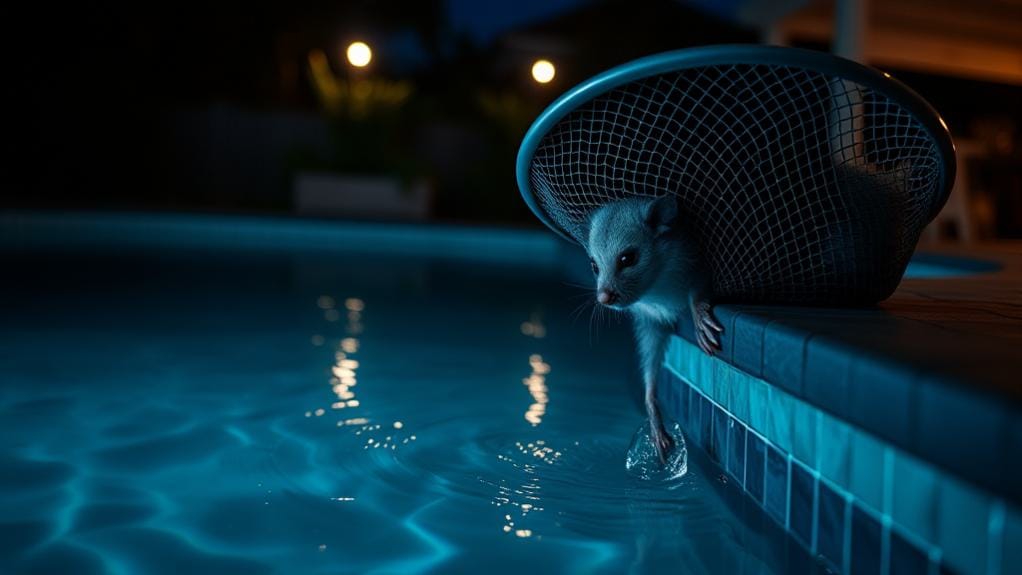Got a possum taking an unwanted dip? Don't panic. Grab a pool net and protective gloves – you'll thank me when you avoid those sharp claws. Approach slowly (spooked possums are way harder to deal with) and gently scoop the critter onto a flat surface using the net. Place it in a shady spot away from the pool to recover. While your uninvited guest dries off, shock your pool with chlorine at 24 ppm to kill any nasties. Want to prevent future midnight swimmers? Install a pool cover or escape ramps. There's plenty more to keeping these furry trespassers at bay.
Understanding Pool Risks for Possums
Table of Contents
While opossums are resourceful creatures, your swimming pool can become a deadly trap for them when they're searching for water. Much like squirrel infestations in homes, possums can create serious problems if they get stuck or die on your property.
I know what you're thinking – these clever climbers should be able to get themselves out, right? Wrong. Those slippery pool edges are no match for their usually impressive climbing skills.
Let's get real about why your pool is basically a death trap for small animals:
- Smooth surfaces make it impossible to grip and climb out
- Hot weather drives wildlife to seek water (and your pool looks mighty inviting)
- Pool chemicals can harm them if they drink the water while trying to survive
*Pro tip: If you want to keep wildlife safe, install escape ramps or specialized devices like Frog Logs. Trust me – it's way better than finding a drowned possum during your morning swim.*
Safety Equipment and Rescue Tools
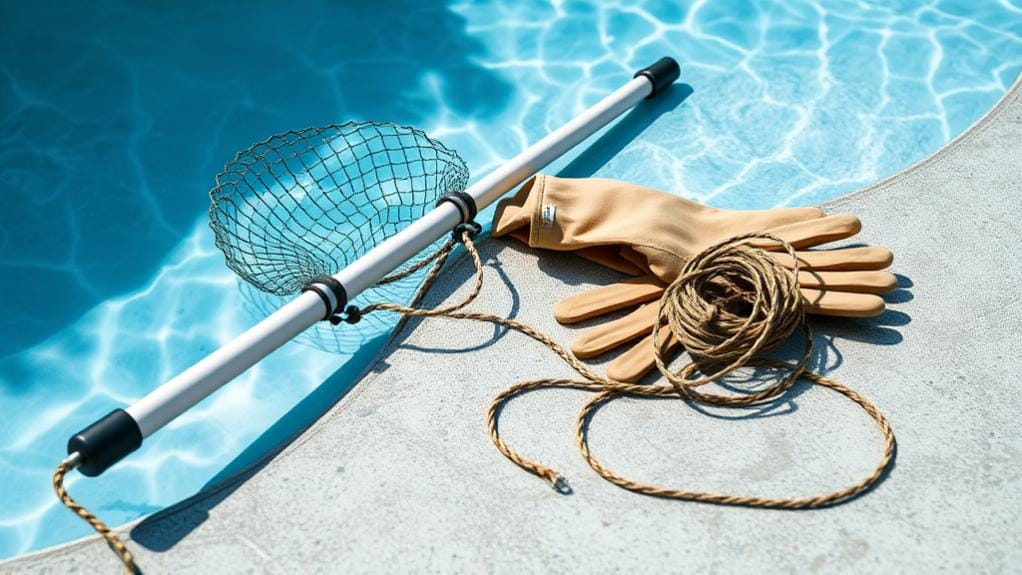
Equipped with the right safety tools, rescuing a possum from your pool doesn't have to be dangerous for you or the animal. You'll need specific rescue tools and safety equipment to handle this hairy situation like a pro.
| Essential Item | Why You Need It |
|---|---|
| Pool Net | Your #1 rescue tool for gentle scooping |
| Protective Gloves | Because nobody wants possum scratches |
| Textured Hose/Towels | DIY escape routes (they can climb!) |
| Skamper Ramp | Permanent solution for repeat visitors |
| Transport Container | Safe relocation box (not your gym bag) |
*Pro Tip: Keep these items easily accessible – possums don't schedule their pool parties in advance!*
Never attempt a rescue without proper safety equipment. I know you're thinking "it's just a possum," but trust me – those little guys can get feisty when scared. Your pool net's your best friend here – it keeps both you and the critter safe.
Emergency Removal Step By Step
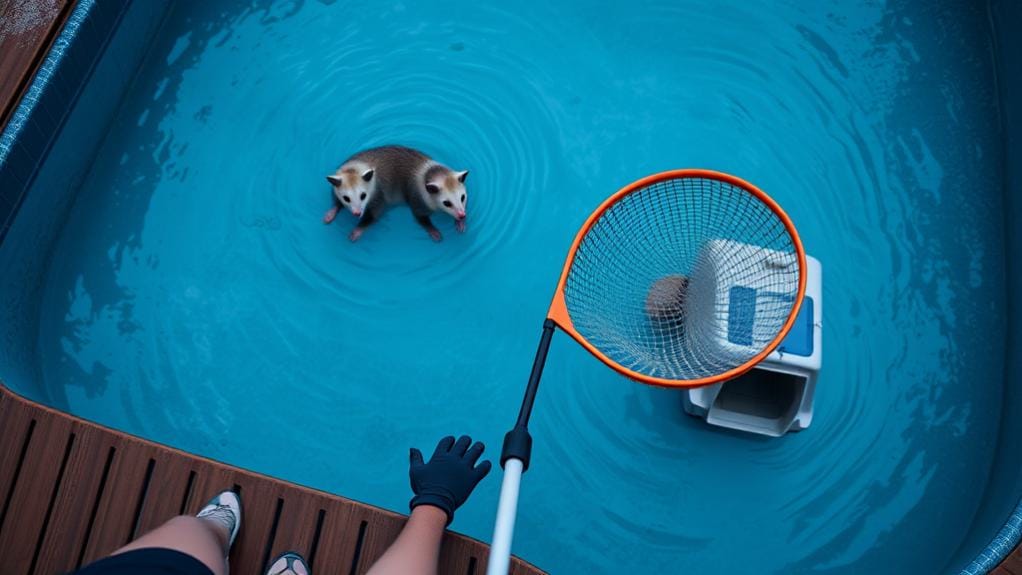
I know you're enthusiastic to play hero, but pool owners need to protect themselves first.
Similar to gentle window rescues, remaining calm and methodical helps guarantee everyone's safety.
Grab your pool net or a flat board – whatever's handy for assisting animals in distress. Just don't use your neighbor's fancy serving tray.
Slowly approach the possum and scoop it out. These aren't Olympic trials – take your time.
Place your soggy friend in a shady spot. Trust me, they've had enough sun for one day.
Pro Tip: Watch for breathing issues or sluggish movement. If your rescue looks rough, call a wildlife pro ASAP.
Remember: The best way to keep animals safe is prevention.
Install pool covers or ramps. Because nobody wants to be the neighborhood possum lifeguard.
Post-Rescue Pool Chemical Treatment
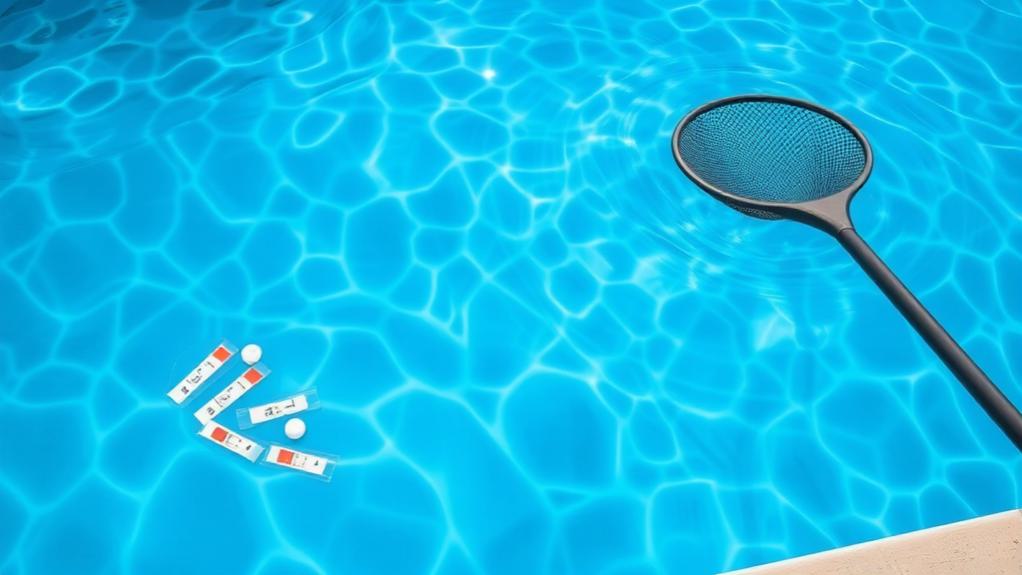
After rescuing our furry friend, your pool needs a proper chemical reset.
Let's get your pool looking and operating safely again – because nobody wants to swim in possum soup! Just like using snake repellent products to keep unwanted visitors away, proper pool maintenance after a rescue is essential for safety.
First, shock that water with chlorine levels at 24 ppm if your CYA is around 60. Trust me, those little swimmers left behind some unwanted gifts you can't see.
Here's your post-rescue pool care checklist:
- Test chlorine after 24 hours – you want 5-9 ppm for safe swimming
- Run an Overnight Chlorine Loss Test to check for lingering issues
- Keep pH between 7.2-7.8 (because chemistry matters, folks!)
- If chlorine's still above 10 ppm, add thiosulfate to bring it down
*Pro Tip: While we love to help animals, prevention is better than treatment. Consider installing a pool cover to avoid future rescue missions!*
Prevention Methods That Work
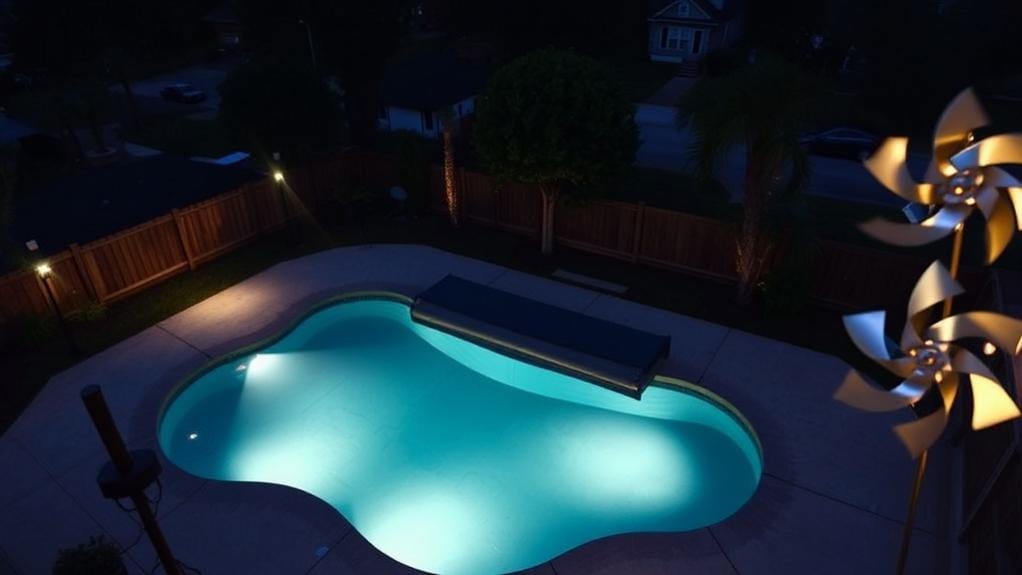
While proper post-rescue pool treatment keeps swimmers safe, I'd rather help you avoid future possum pool parties altogether.
Let's talk prevention methods that really work – because nobody wants to fish larger animals out of their pool at midnight. It's also important to block entry points around your home to prevent possums from establishing territory near your pool area.
Start with a heavy-duty pool cover rated for at least 15 pounds. Trust me, it's worth every penny.
Here's what else you need to do:
- Hang textured ropes or old towels into the pool as escape routes (because possums aren't Olympic swimmers)
- Place water bowls nearby – they're less likely to take a midnight dip if they've got an easier option
- Remove food sources and trim those overhanging trees
- Get your neighbors on board with proper wildlife practices
*Pro Tip: Check your pool cover nightly. One torn corner is all it takes for an unwanted swimmer to crash your pool!*
Local Wildlife Resource Contacts
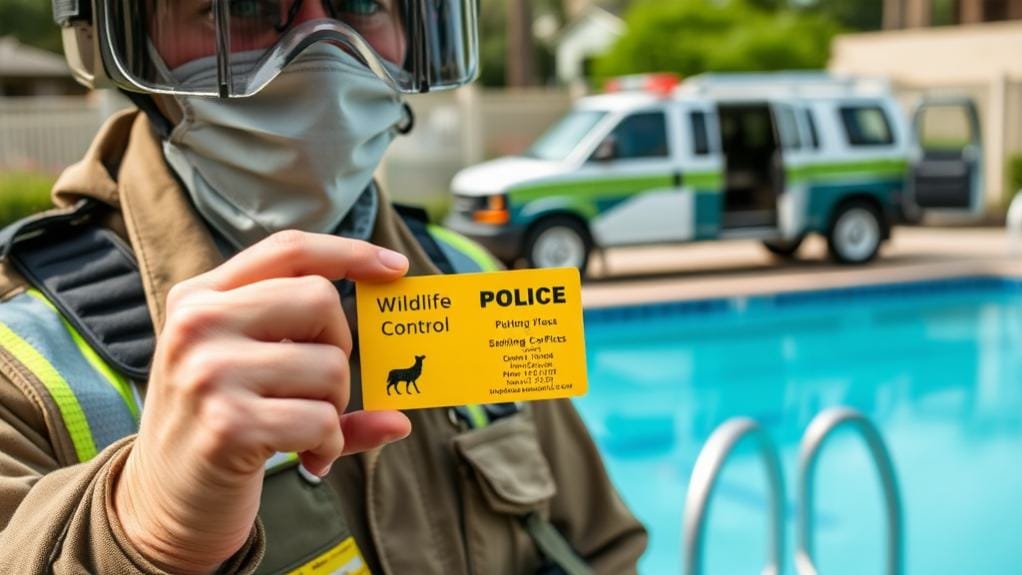
Finding professional help quickly can make all the difference when dealing with a possum in your pool. I've compiled essential local wildlife resource contacts you'll want to save in your phone right now. Trust me, you don't want to be frantically googling at 2 AM when there's a confused possum doing laps in your pool.
| Resource Type | Who to Contact | When to Call |
|---|---|---|
| Emergency | Animal Control | Immediate removal |
| Medical | Wildlife Rehab Centers | Injured possum |
| Prevention | Wildlife Organizations | Ongoing issues |
| Education | Local Gov Hotlines | Training needs |
Look, you could try handling this yourself, but why risk it? Call pest control or contact wildlife rescue organizations – they're literally paid to deal with these situations. *Pro tip: Save these numbers before you need them, because Murphy's Law says that possum's showing up when you least expect it.*
Frequently Asked Questions
How Do You Get a Possum to Leave?
I'll help you guide the possum out by placing fresh water nearby, creating escape paths with towels, and giving it a shaded spot to rest. If it's still struggling, I'll call a wildlife expert.
How Do You Disinfect a Pool After a Dead Animal?
I'd first remove the animal with gloves, then add a jug of bleach and raise chlorine to 10.5 ppm. I'll test water chemistry after shocking the pool before letting anyone swim again.
Do Possums Like Swimming Pools?
I'll tell you that possums don't actually like swimming pools – they're drawn to them for drinking water. Since they're poor swimmers, they often get trapped, making pools a dangerous attraction for them.
Do Dead Animals Contaminate Pool Water?
Like a rotten apple spoiling the barrel, I can tell you dead animals absolutely contaminate pool water. They'll introduce harmful bacteria and pathogens, while depleting chlorine levels needed to keep swimmers safe.
Last Word
I never thought I'd become an expert at fishing possums out of pools, but here we are. While it's not the most glamorous skill, knowing how to safely remove these surprise swimmers could save a life – both theirs and your peace of mind. The irony isn't lost on me that the same pool meant to keep wildlife out becomes nature's most inviting trap. Stay prepared, stay calm, and remember: that possum's probably more freaked out than you are.

